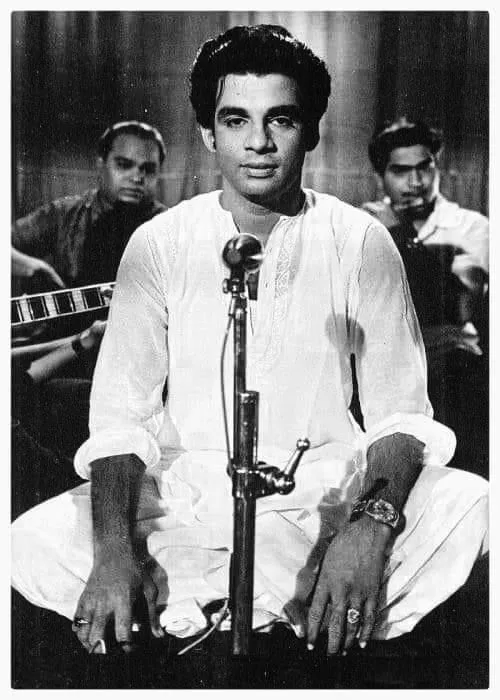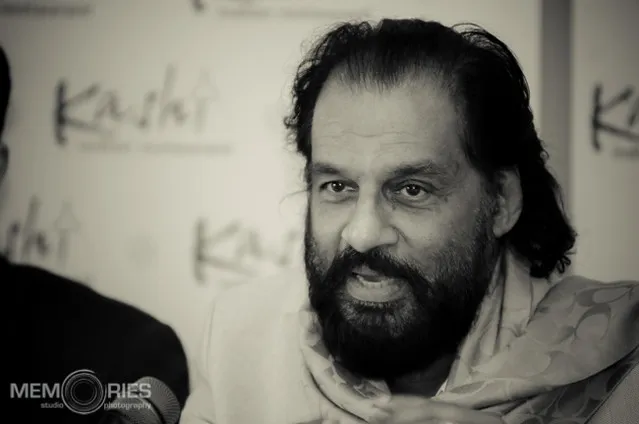A tribute to the legendary voice of Yesudas, whose melodies have transcended generations, cultures, and borders — forever etched in the hearts of Malayalis.
It’s almost past midnight. I couldn’t sleep, so I got up from bed, grabbed my earphones, and took my phone. I searched for my playlist, and there it was. I played my favorite track, closed my eyes, and waited for that celestial voice to fill the silence.
Zid na karo, ab toh ruko, yeh raat nahi aayegi…
Zid na karo, ab toh ruko, yeh raat nahi aayegi…
A timeless classic by Yesudas echoed in my ears — his eternal voice, so soothing, so divine. As the playlist continued, I drifted off to sleep. That’s the magic of Yesudas’s voice.
I’m sure Malayalees like me have heard him more than even our parents’ voices. Our mornings begin with his songs playing through the loudspeakers of nearby temples. His voice transcends religions and seasons — whether it’s the holy Sabarimala season, Christmas celebrations, or even a political rally, his presence is everywhere.
It was through the radio that I first started listening to him. Back then, mornings began with devotional songs, followed by film songs in the afternoon, and devotional melodies again in the evening. Even when we had hundreds of singers, the majority of the songs we listened to were sung by Yesudas. We always waited for Sundays, which had special programs featuring film songs. He ruled the Malayalam film industry like a king, and no one could match his style or voice.
In my teenage years, I made a surprising realisation — he had sung in other languages too! Though the radio occasionally played his songs in Tamil, Hindi, and other languages, it truly hit me when I started tuning in to the Tamil music programs on Radio Ceylon (now Sri Lanka Broadcasting Corporation). The faint, static-filled transmission would carry Ilayaraja’s compositions and other musical gems. We eagerly listened, absorbing every note.
When my father returned from the Middle East, he brought home a cassette player — a luxury in the early ’80s. I still remember the excitement! Unlike the radio, where we had to wait for our favorite songs, this was different. We could decide when and what to play. One of the first cassettes he brought had songs like Shararanthal Thiri Thanu Mukilin Kudilil and Edavakayalil Ayalkkari. Another cassette contained classical renditions by Yesudas, and that was another revelation — he sang Carnatic music! Though I had heard Carnatic songs before, there was something different when Yesudas sang them. His clarity, diction, and unique style revolutionised classical music.
Back in the day, every aspiring singer wanted to imitate Dasettan (as we fondly call him). From his signature white attire — either a white suit or a white kurta and dhoti — to his neatly groomed beard, he was a style icon. Even his white shoes and watch were imitated. At local temples, churches, and cultural programs, singers would not only mimic his voice but also his appearance.
Once, while coming home from school, I noticed a poster announcing a musical concert to raise funds for a church. It was the late ’80s, in the peak of summer. My heart raced — I had to see the legendary singer! I pleaded with my father, but he dismissed my request. However, after my relentless persuasion, he agreed — though not in the way I had expected. Instead of buying tickets, he took us to my uncle’s house, which was near the concert venue. From there, we could partially see the stage. Though I couldn’t see him clearly, I could hear his voice perfectly. Standing on the rooftop for two hours, I listened in awe. He sang his most popular songs and even took requests from the crowd. That night remains one of the happiest memories of my life.
It took another 4–5 years before I could watch him perform in person. This time, it was a Carnatic concert at our temple. By then, I was old enough to attend temple festivals with my parents’ permission. The entire temple premises fell into pin-drop silence as he began to sing. Unlike today, people were patient back then — they sat cross-legged on the temple floor, absorbing every note. At the end, he even sang a couple of film songs. Another magical evening for a small-town boy.
Have you ever been so captivated by someone’s voice that you just couldn’t get enough of it?
In the late ’80s, a Malayalam movie titled Dhwani was released. I knew nothing about its composer, Naushad, but even before the film hit the theaters, its songs were everywhere. A neighbor of mine had bought the cassette, and the moment I found out, I rushed to his house. His youngest brother played the songs for me. As I sat listening, I noticed a girl in the room — a distant relative of theirs. I requested to hear the cassette again. They agreed, but after the second playback, I sensed their impatience. When I asked for a third time, the boy hesitated and then said, “The recorder is overheating.” Disappointed, I left, unaware that I had been a third wheel. Years later, I found out that the boy and the girl had eventually gotten married! Looking back, I laugh at myself — I was so lost in Yesudas’s voice that I had unknowingly intruded on their moments.
Back in the early ’90s, I had a close-knit friend circle that used to meet at a small coffee shop in my hometown. Everyone in the group was incredibly talented. Behind the coffee shop, there was an empty room where we would gather and sing. That’s where I learned many songs.Raghu, Sreekumar, Babukkutty, Sethu, and many of our friends would sing retro classics — especially Yesudas’s timeless melodies. Looking back, I realise that most of the songs I cherish today were learned from that circle. Those were the good old days — filled with music, songs, and, of course, great camaraderie.
If you had asked me back then what my biggest dream was, I would have said, “A bicycle and a Walkman.”
At 14, my father gifted me a bicycle — one of my most treasured possessions. But a Walkman? That was out of reach. Among my neighborhood friends, we had a system — Raghu, an older friend, owned a Walkman, and he would lend it to me for a day, on the condition that I return it by morning. Imagine that! The younger generation today might find it amusing, but that was how I listened to hundreds of songs in my teenage years.
Years later, in 2007, during my internship at a bank, I received my first stipend — ₹600. I had waited an entire month for that money, and I knew exactly what I wanted. I bought a Sony Walkman for Rs550. The sheer excitement of owning that small, portable music player was unparalleled. Even buying a house or a luxury car later in life never gave me that same joy.
My first job was with Kerala’s first cellular company. As part of their promotional campaign, they organised a grand musical event, headlined by none other than Yesudas himself. This time, I wasn’t just an audience member — I was part of the organising team. Watching him perform from the front row, I realized that time had done nothing to his voice. For three hours, he sang non-stop, mesmerising the crowd. Another unforgettable night.
Years later, in the same town, I had another opportunity to watch his Carnatic concert. This time, I sat among the elite crowd of Kottayam, cherishing every moment.

Being born in the mid-‘70s gave me the rare privilege of experiencing the golden era of Yesudas. But even during the COVID lockdowns, I discovered thousands of his lesser-known songs across languages. Whether old or new, his music remains flawless.Not just film songs — his independent music albums were hot sellers back in the day. We still cherish classics like Vasantha Geethangal, Ponnona Tharangini, and many more, listening to them even now.
Reading the YouTube comments under his songs is a testament to his impact. From Malayalees to Tamilians, Maharashtrians to Biharis, people from all corners of India — and even abroad — respect his unparalleled contribution to music. A man from a small state, speaking a language spoken by less than 3% of India’s population, became a legend across the nation. That is the magic of Yesudas.
Even today, as Or Vadakkan Veeragadha is re-released in 4K, one thing remains unchanged — his voice. No technology can replicate his singing, and no one can replace him.Some of the songs I love are older than me, yet they still feel as fresh as a newly released album.
I consider myself blessed — blessed to have lived in the era of Yesudas. His voice has been the bridge of love, the dream companion of an entire generation, and the soundtrack of our lives.
Dasetta, We Listened to You
When we were happy
When we were in sorrow
When we fell in love
When we traveled
When we sought devotion
When we celebrated
When we sat in silence
When nostalgia embraced us
When we dreamed of the future
Through every moment, your magical voice was there — comforting, uplifting, and timeless.
Thank you, Dasetta, for your discipline, your dedication, and your voice. May you live happily and healthily forever. We love you.

